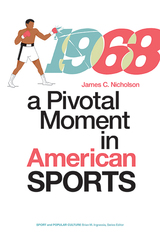
Opening with Vince Lombardi’s last win as coach of the Packers in Super Bowl II and closing with Jo Namath’s Super Bowl III guarantee, 1968 charts a course through the turbulent waters of American sports over a single improbable year. Nicholson chronicles and scrutinizes a number of events that reflected-and fed-the acrimony of that year: the Masters golf tournament, in which enforcement of an arcane rule cost a foreign player a chance at victory; the disqualification of the Kentucky Derby winner for doping; Muhammed Ali’s appeal of a criminal conviction for draft evasion; an unorthodox rendition of the national anthem at the World Series that nearly overshadowed the game it preceded; and a silent gesture of protest at the Mexico City Olympics that shocked the nation and world.
While 1968 was not the first year that sports converged with social and political strife in America, echoes of the past in today’s culture wars bring a heightened relevance to the events of a half century ago. In reading Nicholson’s work, scholars and sports fans alike will receive an instructive glimpse into the nature of persistent division in the United States as it reflected in our national pastimes.
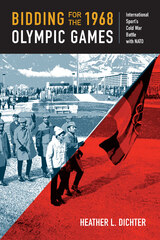
During the Cold War, political tensions associated with the division of Germany came to influence the world of competitive sport. In the 1950s, West Germany and its NATO allies refused to recognize the communist East German state and barred its national teams from sporting competitions. The construction of the Berlin Wall in 1961 further exacerbated these pressures, with East German teams denied travel to several world championships. These tensions would only intensify in the run-up to the 1968 Olympics.
In Bidding for the 1968 Olympic Games, Heather L. Dichter considers how NATO and its member states used sport as a diplomatic arena during the height of the Cold War, and how international sport responded to political interference. Drawing on archival materials from NATO, foreign ministries, domestic and international sport functionaries, and newspapers, Dichter examines controversies surrounding the 1968 Summer and Winter Olympic Games, particularly the bidding process between countries to host the events. As she demonstrates, during the Cold War sport and politics became so intertwined that they had the power to fundamentally transform each other.
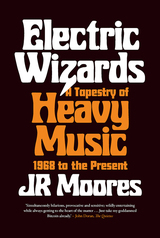
It began with the Beatles’ “Helter Skelter.” It was distilled to its dark essence by Black Sabbath. And it has flourished into a vibrant modern underground, epitomized by Newcastle’s Pigs Pigs Pigs Pigs Pigs Pigs Pigs. This is the evolution of heavy music. The voyage is as varied as it is illuminating: from the lysergic blunt trauma of Blue Cheer to the locked grooves of Funkadelic, the aural frightmares of Faust to the tectonic crush of Sleep, alighting on post-punk, industrial, grunge, stoner rock, and numerous other genres along the way. Ranging from household names to obscure cult heroes and heroines, Electric Wizards demonstrates how each successive phase of heavy music was forged by what came before, outlining a rich and eclectic lineage that extends far beyond the usual boundaries of heavy rock or heavy metal. It extols those who did things differently, who introduced something fresh and exciting into this elemental tradition, whether by design, accident, or sheer chance. In doing so, Electric Wizards weaves an entirely new tapestry of heavy music.
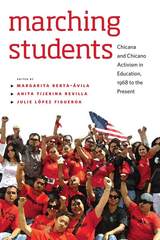
Contributors: Alejandro Covarrubias, Xico González, Eracleo Guevara, Adriana Katzew, Lilia R. De Katzew, Rita Kohli, Edward M. Olivos, Alejo Padilla, Carmen E. Quintana, Evelyn M. Rangel-Medina, Marianna Rivera, Daniel G. Solórzano, Carlos Tejeda
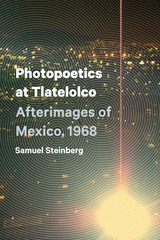
In the months leading up to the 1968 Olympic games in Mexico City, students took to the streets, calling for greater democratization and decrying crackdowns on political resistance by the ruling PRI party. During a mass meeting held at the Plaza of the Three Cultures in the Tlatelolco neighborhood, paramilitary forces opened fire on the gathering. The death toll from the massacre remains a contested number, ranging from an official count in the dozens to estimates in the hundreds by journalists and scholars. Rereading the legacy of this tragedy through diverse artistic-political interventions across the decades, Photopoetics at Tlatelolco explores the state’s dual repression—both the massacre’s crushing effects on the movement and the manipulation of cultural discourse and political thought in the aftermath.
Examining artifacts ranging from documentary photography and testimony to poetry, essays, chronicles, cinema, literary texts, video, and performance, Samuel Steinberg considers the broad photographic and photopoetic nature of modern witnessing as well as the specific elements of light (gunfire, flares, camera flashes) that ultimately defined the massacre. Steinberg also demonstrates the ways in which the labels of “massacre” and “sacrifice” inform contemporary perceptions of the state’s blatant and violent repression of unrest. With implications for similar processes throughout the rest of Latin America from the 1960s to the present day, Photopoetics at Tlatelolco provides a powerful new model for understanding the intersection of political history and cultural memory.
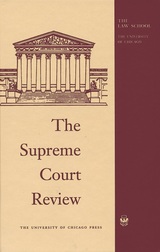
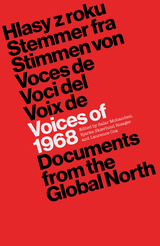
Voices of 1968 is a vivid collection of key texts from the movements and uprisings of “the long 1968.” Emphasizing the transnational linkages between these struggles, the primary documents of this collection delve into events that took place as far afield as Italy, France, West Germany, the United States, Mexico, Canada, Britain, Northern Ireland, Denmark, Czechoslavakia, Yugoslavia, and Japan. This wealth of material is supported by framing essays helping readers to find their way around the era’s revolutionary ideas and to understand their legacy in politics, culture, and society today. Featuring many texts that have never been seen in English before, this remarkable collection is published to coincide with the fiftieth anniversary of the events of 1968.

From Paris to Peking, from Saigon to Washington, the pillars of the postwar world tottered on the brink of collapse in 1968. Year of the Heroic Guerrilla is the first global analysis of that universal upheaval.
Daniels vividly depicts the great crises of that era: the Tet offensive and the abdication of Lyndon Johnson; the denouncement of the counterculture; the fissuring of the civil rights movement and the assassination of Martin Luther King, Jr.; the student revolt at Columbia University; the May uprising in France that nearly overthrew the Fifth Republic; the "cultural revolution" in China; the chilling of the Prague Spring by the Soviet army; and, finally, the convention and riots in Mayor Daley's Chicago, signaling the downturn of the revolutionary spirit in America.
READERS
Browse our collection.
PUBLISHERS
See BiblioVault's publisher services.
STUDENT SERVICES
Files for college accessibility offices.
UChicago Accessibility Resources
home | accessibility | search | about | contact us
BiblioVault ® 2001 - 2024
The University of Chicago Press









